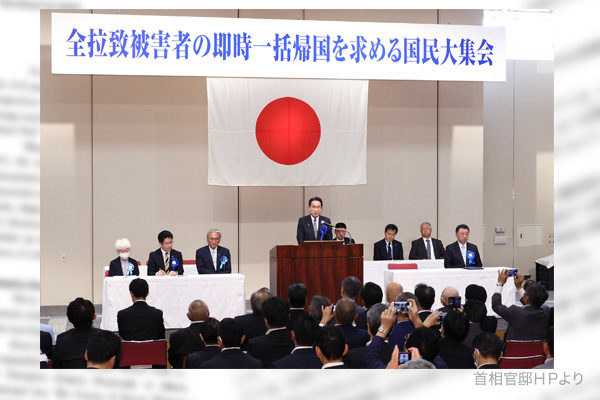A breakthrough over North Korea’s abduction of Japanese citizens may come. “Japan will press forward proactively, engaging in high-level consultations while reporting directly to me, to bring about summit-level talks [with North Korea] at an early time,” Japanese Prime Minister Fumio Kishida said in his address to a rally organized by the association of the families of abductees and others on May 27. Just two days later on May 29, North Korea released Vice Foreign Minister Pak Sang Gil’s statement saying, “there is no reason for the DPRK [Democratic People’s Republic of Korea] and Japan not to meet.”
“No reason for the DPRK and Japan not to meet”
At a similar meeting last October, Kishida said, “the abduction is a human rights issue with time constraints.” This time, Kishida emphatically said, “the abduction, an issue whose resolution has time constraints, is a human rights issue about which we cannot let our mindfulness dwindle for even a moment.”
“The longer the current situation continues, the more difficult it will be to build a new relationship between Japan and North Korea,” Kishida said in line with the argument by the families and their supporting organization that unless North Korea returns all Japanese abductees while their parents are alive, it will be impossible for Japan to improve relations with North Korea. “Based on a broad perspective, I will […] make my own decisions […] for both Japan and North Korea,” Kishida added right after proposing high-level consultations.
The North Korean vice foreign minister said at the outset of the statement, quoting Kishida, “It is reported that Japanese Prime Minister Kishida said at a rally on May 27 that it is very important to build the relations between the top leaders of the DPRK and Japan, and clarified his intention to hold a high-level consultation for early realization of the DPRK-Japan summit.” In a manner to bash Japan, however, the vice minister said, “Japan is now talking about the ‘summit talks without preconditions’ but, in fact, it is clamoring for settlement over the abduction issue, which had already been resolved, and the DPRK's right to self-defense, and putting forward it as a precondition for improving the DPRK-Japan relations.”
But the North Korean refrained from rejecting Kishida’s proposal, saying “It is the stand of the DPRK government that if Japan tries to make a new decision from a broad perspective of recognizing each other as it is intact in conformity with the changed international trend and the times, not being shackled by the past, and seeks a way out for improving the relations, there is no reason for the DPRK and Japan not to meet.” I would like to pay attention to “a new decision from a broad perspective” in this passage, because Kishida vowed to make his own “decisions” based on “a broad perspective,” as noted above. The North Korean statement purposely repeated the words in Kishida’s address.
Be cautious about a trick proposal
Any external message by North Korea must be approved by Chairman Kim Jong Un. Kishida delivered the address around 2:30 p.m. on May 27. Pyongyang should have immediately made a transcript of the address, translated it into Korean, handed the text to Kim, prepared the vice minister’s statement at Kim’s instruction, got Kim’s approval and issued the statement. The whole process was completed just in a day and a half.
The quick response indicates Pyongyang’s zeal for talks with Tokyo. Behind-the-scenes secret talks might have started or are likely to start soon. At such talks, however, Pyongyang may propose the establishment of a joint survey committee on abductees or other tricks, rather than the immediate return of all Japanese abductees. We should carefully watch how things develop.
Tsutomu Nishioka is a senior fellow and a Planning Committee member at the Japan Institute for National Fundamentals and a visiting professor at Reitaku University. He covers South and North Koreas.


